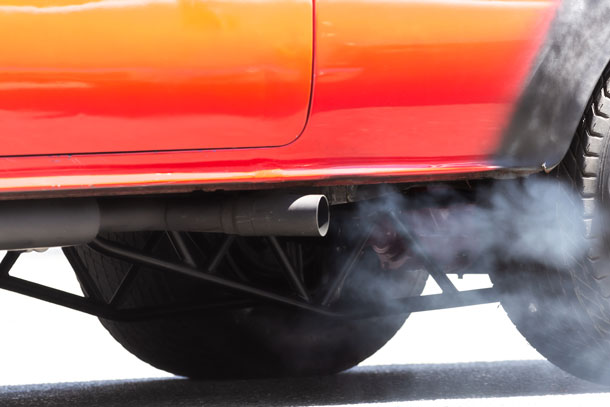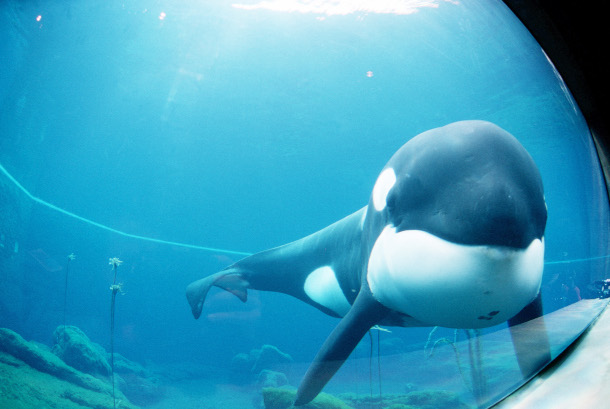Beyond the Headlines
Air Date: Week of July 14, 2023

This year, Georgia peach trees have only produced about one-third of their normal crop volume. (Photo: Thomas Cizauskas, Flickr, CC BY-NC-ND 2.0)
This week, Living on Earth Contributor Peter Dykstra joins Host Aynsley O’Neill to mourn the loss of most of Georgia’s crop of juicy peaches in 2023, thanks in part to an unusually warm winter. Also, a meta-study finds that low-emission zones in some cities are reducing heart attacks, strokes, and breathing problems. And in history, it’s the 30 year anniversary for the release of the film “Free Willy” that was based on the plight of a real captive orca whale named Keiko.
Transcript
O'NEILL: It's time now for look beyond the headlines with Peter Dykstra living on Earth contributor who is joining us from Atlanta, Georgia. Hi, Peter. How are you doing down there in Georgia this week?
DYKSTRA: Oh, hi Aynsley, we've got some not so good news for my fellow Georgians. Georgia peaches had such a horrible winter, it was too warm, likely and linked, at least in part to climate change that all the peaches we've got in my neighborhood grocery are from California. They look great, they're bigger than Georgia peaches and they taste terrible. Georgia peaches are deeply missed and a point of pride that for at least this one year, we don't have.
O'NEILL: Yeah, Peter, according to your license plates aren't peaches kind of the whole thing down there in Georgia? What happened?
DYKSTRA: Yeah, Georgia is the Peach State. It's actually the third largest peach producer in the country. South Carolina produces far more peaches, although they've also been hit hard by the bad year but the biggest producer far and away, bigger than South Carolina and Georgia combined, is the State of California, who are kind enough to ship us more expensive, big hard unjuicy peaches, that tastes like wax fruit.
O'NEILL: Oh, that's a shame Peter, you deserve a good peach.
DYKSTRA: Don't we all?
O'NEILL: So what else do you have for us this week?
DYKSTRA: There's a meta study—a study of other studies—published recently in the Lancet Public Health Journal. It originated with the Imperial College of London. Low Emission zones in European cities and Japanese cities are showing some success in improving health for in town residents, in respiratory related hospital admissions, heart attacks, strokes, asthma and other things. Low emission zones are just getting started under consideration in the US. New York City has a proposal underway. We'll see how far that gets and how well it works. But there is some fairly convincing proof in some of the studies that Imperial College of London looked at suggesting that when you cut down vehicle emissions, whether it's from private cars or taxis or diesel buses or trucks, it is going to help in terms of improved respiratory health for city dwellers.

Low emissions zones are better for human health in urban centers. (Photo: Cindy Shebley, Flickr, CC BY 2.0)
O'NEILL: With all the poor air quality that we've all been getting from those Canadian wildfires, I think we can use all the help we can get. Now, Peter, what do you have for us from the history books this week?
DYKSTRA: It's the 30th anniversary of the release on July 16, 1993 of the movie, Free Willy. It was a minor box office hit based loosely on the captivity of Keiko, an orca whale that was kept in a cramped tank at a little amusement park in Mexico City. The tank was compared to a human being stuck in a bathtub for years. Orcas like to roam the ocean searching for food, cover many miles in a day, Keiko was in a tank where the whale could barely turn around. After the Free Willy movie came out public pressure eventually got the whale released from its captivity. But in 2003, Keiko was released to the wild off Iceland. And unlike the Happy Endings we know from Hollywood, this one had a sad ending. Keiko died after a short time in the wild, but still the movie inspired a movement that eventually began to get orcas completely out of the business of displaying them for human amusement in small tanks.

Keiko, the orca who starred as Willy in Free Willy was the first captive orca to be fully released back into the ocean. (Photo: United States National Archives, Wikimedia Commons, Public Domain)
O'NEILL: All right, well, thanks Peter. Peter Dykstra is a Living on Earth contributor and we will talk to you again soon.
DYKSTRA: Aynsley, thanks a lot. Talk to you soon.
O'NEILL: And there's more on these stories on the Living on Earth website, That's loe.org.
Links
The New York Times | “What’s a Georgia Summer Without Peaches? Not So Sweet.”
The Guardian | “Low Emission Zones Are Improving Health, Studies Show”
Living on Earth wants to hear from you!
Living on Earth
62 Calef Highway, Suite 212
Lee, NH 03861
Telephone: 617-287-4121
E-mail: comments@loe.org
Newsletter [Click here]
Donate to Living on Earth!
Living on Earth is an independent media program and relies entirely on contributions from listeners and institutions supporting public service. Please donate now to preserve an independent environmental voice.
NewsletterLiving on Earth offers a weekly delivery of the show's rundown to your mailbox. Sign up for our newsletter today!
 Sailors For The Sea: Be the change you want to sea.
Sailors For The Sea: Be the change you want to sea.
 The Grantham Foundation for the Protection of the Environment: Committed to protecting and improving the health of the global environment.
The Grantham Foundation for the Protection of the Environment: Committed to protecting and improving the health of the global environment.
 Contribute to Living on Earth and receive, as our gift to you, an archival print of one of Mark Seth Lender's extraordinary wildlife photographs. Follow the link to see Mark's current collection of photographs.
Contribute to Living on Earth and receive, as our gift to you, an archival print of one of Mark Seth Lender's extraordinary wildlife photographs. Follow the link to see Mark's current collection of photographs.
 Buy a signed copy of Mark Seth Lender's book Smeagull the Seagull & support Living on Earth
Buy a signed copy of Mark Seth Lender's book Smeagull the Seagull & support Living on Earth

